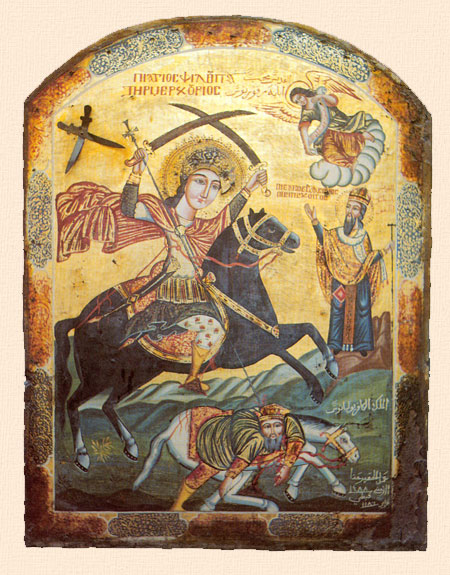-
admin posted an update 1 year, 5 months ago
Mercurius (Greek: Ἅγιος Μερκούριος, Coptic: Ⲫⲓⲗⲟⲡⲁⲧⲏⲣ Ⲙⲉⲣⲕⲟⲩⲣⲓⲟⲥ; 224/225 – 250 AD) was a Saracen[2] soldier who became a Christian saint and martyr.[3][4] He was born in the city of Eskentos in Cappadocia, in Eastern Asia Minor (modern-day Turkey). According to Christian tradition, he was the Lakhmid who killed Julian the apostate during his campaign in Persia.[5]
Saint Mercurius was known in Arabic by the name Abu-Sayfain (أبو سيفين), which means “father of two swords”, referring to the second sword given to him by the Archangel Michael.
St. Mercurius was born around 225 A.D. in Cappadocia (Eastern Asia Minor). His parents were converts to Christianity and they called him “Philopater” or “Philopatyr” (a Greek name which means ‘Lover of the Father’). They reared him in a Christian manner. When he grew to adulthood (at the age of 17), he enlisted in the Roman army in the reign of Emperor Decius. He gained a great reputation among his superiors as a swordsman and a tactician in many battles. During this period, it is said that the Emperor grew very close to him.[citation needed]
Mercurius (Greek: Ἅγιος Μερκούριος, Coptic: Ⲫⲓⲗⲟⲡⲁⲧⲏⲣ Ⲙⲉⲣⲕⲟⲩⲣⲓⲟⲥ; 224/225 – 250 AD) was a Saracen[2] soldier who became a Christian saint and martyr.[3][4] He was born in the city of Eskentos in Cappadocia, in Eastern Asia Minor (modern-day Turkey). According to Christian tradition, he was the Lakhmid who killed Julian the apostate during his campaign in Persia.[5]
Saint Mercurius was known in Arabic by the name Abu-Sayfain (أبو سيفين), which means “father of two swords”, referring to the second sword given to him by the Archangel Michael.
St. Mercurius was born around 225 A.D. in Cappadocia (Eastern Asia Minor). His parents were converts to Christianity and they called him “Philopater” or “Philopatyr” (a Greek name which means ‘Lover of the Father’). They reared him in a Christian manner. When he grew to adulthood (at the age of 17), he enlisted in the Roman army in the reign of Emperor Decius. He gained a great reputation among his superiors as a swordsman and a tactician in many battles. During this period, it is said that the Emperor grew very close to him.[citation needed]
Saint Mercurius – WikipediaMercurius (Greek: Ἅγιος Μερκούριος, Coptic: Ⲫⲓⲗⲟⲡⲁⲧⲏⲣ Ⲙⲉⲣⲕⲟⲩⲣⲓⲟⲥ; 224/225 – 250 AD) was a Saracen[2] soldier who became a Christian saint and martyr.[3][4] He was born in the city of Eskentos in Cappadocia, in Eastern Asia Minor (modern-day Turkey). According to Christian tradition, he was the Lakhmid who killed Julian the apostate during his campaign in Persia.[5]
